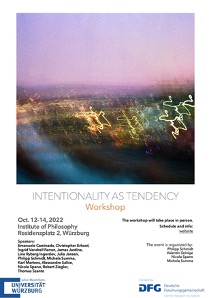Workshop "Intentionality as Tendency"
12-14 October, 2022
Intentionality, in phenomenology, is understood as one of the central features of consciousness, in particular as that which defines the structure of acts. A perception, a judgment, an act of will, or a feeling are intentional insofar as they are directed at objects or states of affairs. The characterization of intentional consciousness as object-directedness has been reassessed and adjusted in the developmentof the phenomenological movement: for instance, with Husserl’s analyses of temporality and the passive syntheses, Heidegger’s discussion of mood, and Merleau-Ponty inquiry into the different forms of behavior and bodily intentionality. That said, the characterization of intentionality as object-directedness is still often taken for granted, although the mentioned analyses also motivate the view that intentionality is not primarily, let alone exclusively, to be understood as directedness at a determinate object.
In the texts written around the years 1913/14, Husserl explicitly concentrates on the distinction between object-directed and nonobject-directed intentionality and works intensively on the characterization of their relation. Thus, he not only develops his phenomenological investigations of consciousness by shedding light on the structures of object-directed acts (as we can see, for instance in Ideas I), but rather extends the focus of his inquiry by also investigating the intentional processes that do not seem to already have a defined object. Husserl uses the notion of ‘tendency’ to refer to the process-like intentionality that is not (yet) directed at a determinate object. Crucially, he often indicates that the indeterminate tending-towards should be seen as the most basic and encompassing mode of being of consciousness. The structures of accomplishment of intentionality as tendency are partly discussed in the manuscripts Husserl wrote for the revision of the Sixth Logical Investigation (notably Hua XX/2) and later in the Analyses Concerning Active and Passive Synthesis (Hua XI and XXXI) as well as in the manuscripts collected by Landgrebe in the work Experience and Judgment. But the most extensive analyses of intentionality as tendency - embracing the doxastic, volitional, and affective dimension of conscious life - can be found in the recently published Studien zur Struktur des Bewusstseins (Hua XLIII).
The aim of this workshop is to systematically and historically investigate the characterization of intentionality as a tendency. Presentations will evaluate the systematic function of the analyses of intentionality as a tendency in the different fields of conscious experience, focusing on how Husserl’s analyses in the newly published Studien relate to alternative analyses on indeterminate intentionality, particularly to be found in the other phenomenological movements (e.g. the Munich and Göttingen circles or post-Husserlian phenomenology) as well as in the fields of philosophy of psychology and psychoanalysis.



